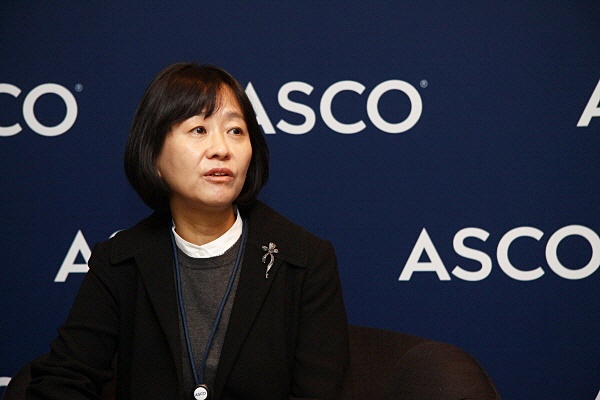CHICAGO, Ill. -- A Korean study has shown that Pfizer's Ibrance extends the survival rate of premenopausal hormone-positive metastatic breast cancer patients by 34 percent.
Presented by Professor Park Yeon-hee at Samsung Medical Center during the ASCO 2019 convention here, the study was meaningful as the research focused on both Koreans and Westerners. Unlike most other researches, the study received research fund from the Korean Cancer Study Group, not pharmaceutical companies.

Meeting with Korean journalists Monday, Professor Park explained why the trial is an essential step for premenopausal breast cancer patients in Korea.
"As Ibrance has only an indication for treating postmenopausal breast cancer, younger women with breast cancer have had to receive an ovariectomy to receive the treatment," Professor Park said. "In that sense, the study showed this treatment showed better results than conventional chemotherapy. This is significant because it opened the way to avoid chemotherapy."
Park stressed that the study might have been more meaningful if there had been a separate hormone treatment control, but she expected that the new hormone therapy and Ibrance treatment would become a standard therapy for both premenopausal and postmenopausal patients.
"The study is important for Koreans as many local breast cancer patients contract the disease at a young age," Park said. "As the life span has been sharply extended, however, it has become important to increase the quality of life for patients."
In the meantime, studies similar to this one are being conducted in Europe, and the indication is expected to expand accordingly, she added.
The research, named Young-PEARL, included 184 patients with hormone-positive, HER2-negative, and metastatic breast cancer, who were receiving tamoxifen treatment before the study at 14 local medical institutes. About 80 percent of the participants were resistant to tamoxifen treatment. The median age was 44 years old, and the metastatic sites were lung (32 percent), bone (23 percent) and liver (20 percent).
In the study, researchers randomly divided the participants into two groups – one that received chemotherapy Xeloda and another that received Ibrance after receiving a hormone combination therapy consisting of exemestane and leuprolide.
The average progression-free survival (PFS) for the Ibrance group was 20.1 months compared to the other group’s 14.4 months. The results were similar in sub-analyses between those who had not received prior chemotherapy treatment and those who had.
There no differences between the overall objective response rate and response duration, however.
There were hematologic side effects, as well as many cases of neutropenia. Although patients had to visit the hospital to check the side effects regularly, that did not lead to any severe disability or death as well as no serious toxicity.
"Nevertheless, the safety evaluation of long-term treatment is necessary as well as confirming whether the overall survival benefit will be improved," Professor Park said.

